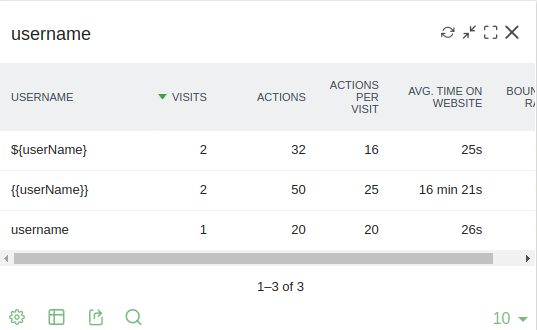I want to need, display the username of login username from the local code to the Motomo dashboard.
- here this is App/tsx file. I implemented code for fetching username from Microsoft-AD.
useEffect(() => {
// Function to handle Microsoft login and retrieve user information
async function handleMicrosoftLogin(): Promise<void> {
try {
await msalInstance.initialize();
// Initialize the MSAL instance
await msalInstance.handleRedirectPromise();
// Redirect the user to the Microsoft login page
const loginRequest = {
scopes: ['user.read'],
};
msalInstance.loginRedirect(loginRequest);
// After successful login, handle the redirect back to your website
const response = await msalInstance.handleRedirectPromise();
if (response !== null) {
// Get the user's account information
const account = msalInstance.getAccountByHomeId(response.account?.homeAccountId);
// Access the user's name and email if the account is not null
const userName = account?.name ?? 'Unknown';
const userEmail = account?.idTokenClaims?.emails?.[0] ?? 'Unknown';
// Print the user's name and email in the console log
console.log('User Name:', userName);
console.log('User Email:', userEmail);
// Replace the placeholders in the Matomo script with the actual userName
const modifiedMatomoScript = `
var _paq = window._paq = window._paq || [];
_paq.push(['setCustomDimension', 1, '${userName}']);
`;
// Create a new script element
const script = document.createElement('script');
script.text = modifiedMatomoScript;
// Append the script to the document body
document.body.appendChild(script);
}
} catch (error) {
console.error('An error occurred during Microsoft login:', error);
}
}
handleMicrosoftLogin();
}, []);
- this is index.html file.
<!-- Matomo -->
<script>
var _paq = window._paq = window._paq || [];
/* tracker methods like "setCustomDimension" should be called before "trackPageView" */
_paq.push(["setCookieDomain", "*.localhost"]);
_paq.push(['setCustomDimension', 1, `${userName}`]);
_paq.push(['trackPageView']);
_paq.push(['enableLinkTracking']);
(function() {
var u="//localhost:8080/";
_paq.push(['setTrackerUrl', u+'matomo.php']);
_paq.push(['setSiteId', '5']);
var d=document, g=d.createElement('script'), s=d.getElementsByTagName('script')[0];
g.async=true; g.src=u+'matomo.js'; s.parentNode.insertBefore(g,s);
})();
</script>
-
output of Matomo Dashboard.

-
so how to pass that username from the local code to Matomo Dashboard?